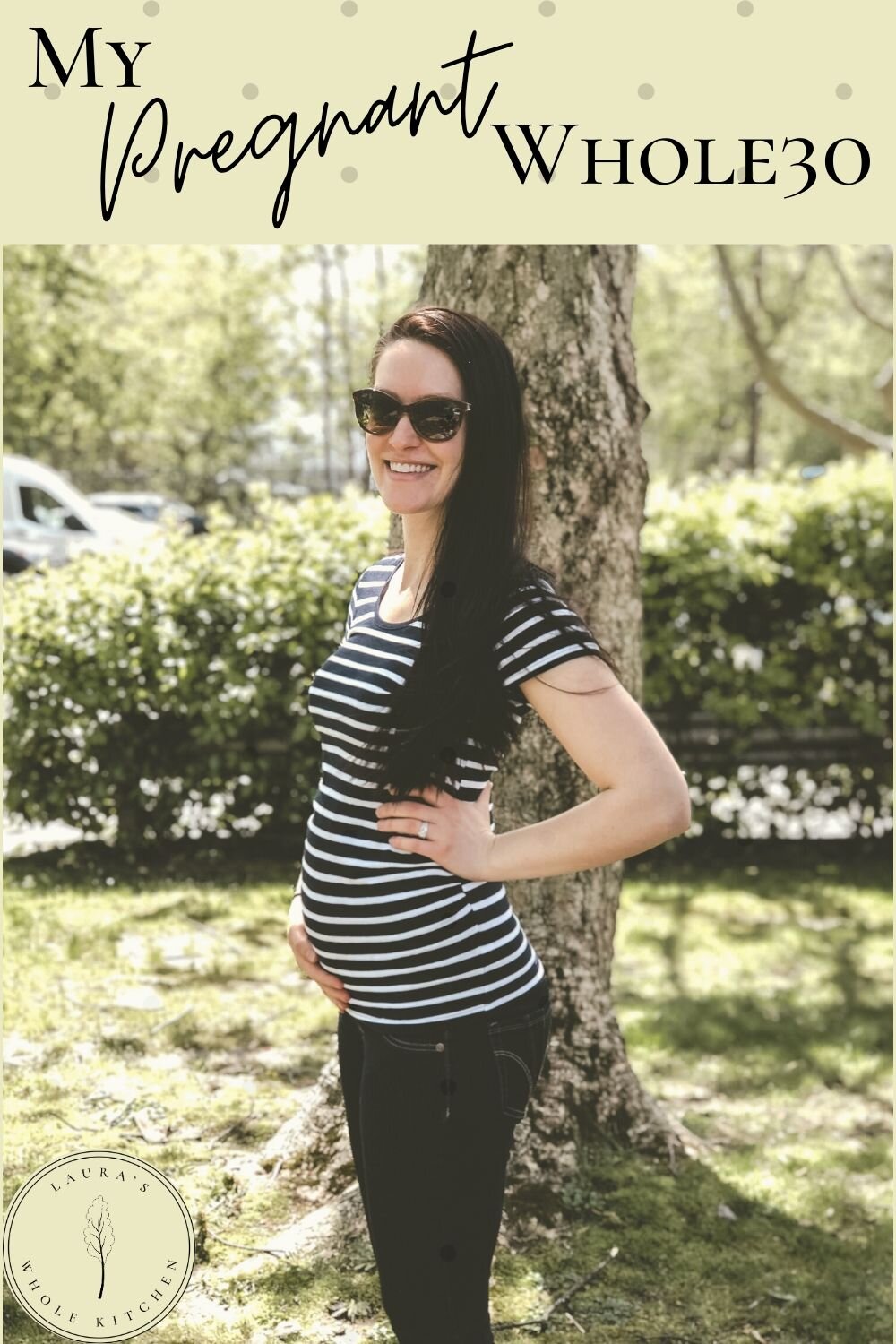My Pregnant Whole30
Back in January, when I found out I was four weeks pregnant, I was just finishing up a Whole30 while coaching a January Whole30 group. I felt fantastic at this time and continued with my Whole30, grateful that my baby had never been exposed to alcohol or sugar and that I happened to have been consuming only real, whole foods since conception. I thought that I would be able to continue eating this way throughout my pregnancy, since I felt so great! Then the nausea and fatigue hit and I needed to follow my Food Freedom as it led me through a somewhat challenging first trimester (read more about that here).
In the second trimester, I felt much better, but had a hard time shaking some of the habits I had developed during the first trimester. I found myself eating more sugar than I knew I should have, and more carbs than made me feel well. As if eating well during pregnancy weren’t challenging enough, I was forced to stay home, and grocery shopping was tricky at best. I knew I needed a dietary reset in order to get back to feeling well and give my baby the nutrients he/she needed.
When the #Whole30AtHome began on April 13, I wanted to join in but felt pretty anxious about it. I felt unprepared and uncertain of whether I could really do a Whole30 while pregnant and stuck at home. I thought about it for a few more days and decided that I would prepare myself well, including stocking up on compliant items and creating a list of meals to make for at least the first two full weeks. I also committed to quitting the Whole30 if I found that it was not serving myself and my baby at that time in my pregnancy. This may be surprising to hear coming from a Whole30 Certified Coach! But what I have learned is that the goal of the Whole30 is not to complete a challenge come hell or high water—it’s to change your health and your habits. My “why” for this Whole30 was mostly to contribute to my baby’s health as much as possible, and I knew that if it was stressful or I felt like my dietary needs were not being met, that would defeat the purpose of a pregnant Whole30. I also knew that I still had several months of being pregnant during which I could try again.
So, at 18 weeks pregnant, I began my umpteenth Whole30, but with a brand new “why” and some additional flexibility. I still felt a little uncertain but decided I would just give it a try and be gracious with myself if I decided to quit. To my surprise (and relief), it was awesome! I honestly think this was one of my easiest Whole30s ever. I felt great and saw improvement in some of my pregnancy symptoms related to sleep, digestion, and cravings, even though I had assumed they were just normal pregnancy symptoms that I couldn’t do anything about. Grocery shopping was not nearly as challenging as I expected—as long as I had fresh veggies and fruits, as well as meats (which I ordered online), creating compliant meals was a breeze. Any time I felt a craving or started longing for my favorite cupcakes, I thought about my “why”—I was doing this for the health of my unborn baby—and I felt highly motivated to stay on track.
As you might expect, my pregnant Whole30 was different from any of my previous Whole30s. Here are some of the things I did differently this time around:
I ate more carbs in the form of potatoes and fruit than I ever have during a Whole30. I ate my Sheet Pan Sweet Potato Hash pretty much every single day (topped with some eggs for that super-important choline!) and sometimes also potatoes with dinner. I ate a lot of berries and apples with almond butter for snacks. This just felt like what my body needed.
I drank smoothies some mornings with breakfast. Smoothies are discouraged on the Whole30 because drinking a smoothie is less satiating than chewing your food. I had smoothies a handful of times during my Whole30 alongside actual food, rather than as a meal. I made smoothies with avocados, spinach, berries, and collagen powder (which is also great for a developing baby).
I had snacks or additional mini-meals most days. Snacking is also discouraged on the Whole30 unless you are pregnant. Normally, you should just try to eat larger meals, but that can be tough during pregnancy when you have a growing baby pressing on your stomach. Of course, you should always eat when you’re hungry—pregnant or not—and some days of my pregnancy I am insatiably hungry, so I eat extra.
I kept my cooking much simpler than usual. I absolutely love to cook, and I really enjoy making elaborate healthy meals. But during pregnancy, I have scaled way back on my time in the kitchen in favor of rest. For my Whole30, I prepped my Sheet Pan Sweet Potato Hash for breakfast, ate a lot of salads with hard boiled eggs or Safe Catch tuna for lunch, and had meat and veggies for dinner. Remember that your meals don’t have to be impressive or Instagram-worthy to be Whole30 compliant!
I checked in with myself regularly to reflect on whether this was still serving baby and me. I never wanted this Whole30 to be about proving to myself or anyone else that a pregnant Whole30 can be done. I only wanted what was best for baby and me, and I made sure to continually evaluate whether my Whole30 was aligning with this goal. Honestly, this is a practice I should more consistently implement in all of my Whole30s to ensure that the program is serving me physically, mentally, and emotionally, since it’s not just about sticking to the diet—it’s about nurturing a healthy relationship with food.
Doing a Whole30 during pregnancy was an excellent choice for me and I’m really glad I decided to go for it even though I was unsure of how it would go. I gained back some of the energy that my excess sugar intake had probably drained from me, I reduced my bloating, I reset some habits, I immediately discovered that oatmeal had not been agreeing with me after all, I finally got that “pregnancy glow”, and I gave my baby 30 full days of whole, nutrient-dense foods.
If you’re currently expecting and considering a Whole30, make sure to discuss it with your provider before getting started! Be prepared with an explanation of the program so that they don’t assume you’re asking about a weight loss (e.g., calorie-restricting) diet.



